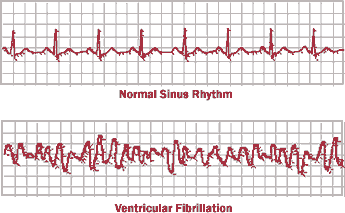Sudden cardiac arrest (SCA) is a leading cause of death in the United States, striking more than 250,000 individuals each year. Sudden cardiac arrest can happen anywhere, to anyone, at any time - without warning, without symptoms, and regardless of age or general health. People who suffer sudden cardiac arrest usually do not know in advance that they are vulnerable to this fatal condition.
SCA is most often caused by ventricular fibrillation (VF), an irregular, quivering heart rhythm. The victim stops breathing, and no pulse is present. Defibrillation, an electric shock to the heart, is the only effective treatment for VF, stopping the chaotic activity and allowing a coordinated heart rhythm to resume. SCA can be caused by electrical shock, allergic reaction, drug overdose, suffocation, drowning, heart attack (myocardial infarction), or, in many cases, for no apparent reason.
